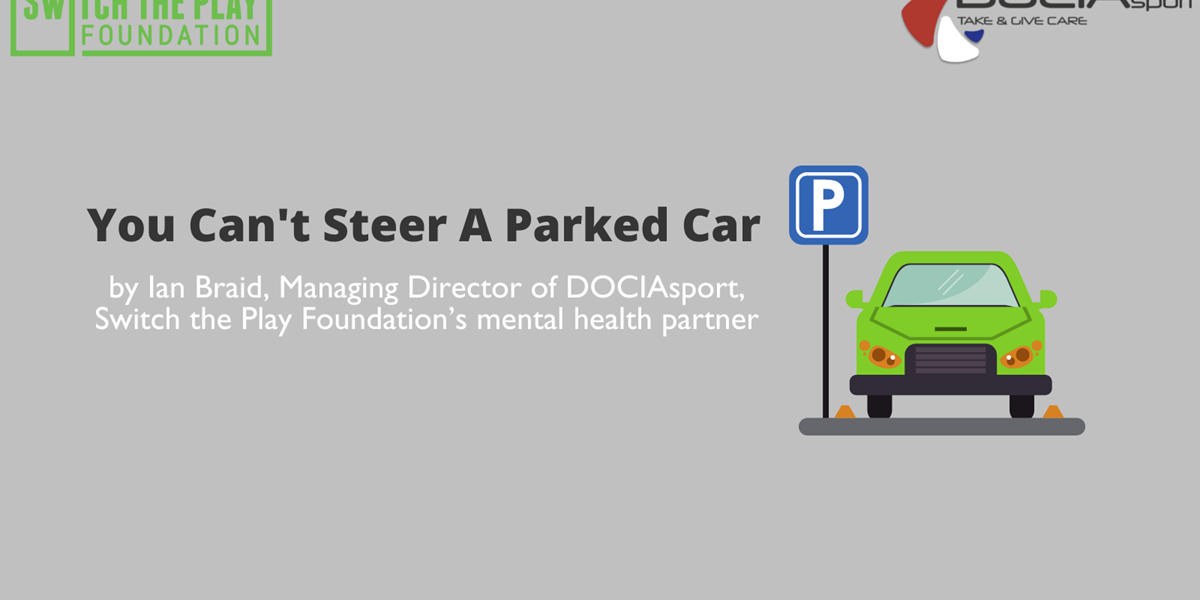You Can't Steer A Parked Car
Posted on: 10 October 2022 by Ian Braid, DOCIA Sport

‘Athlete Transition’ is a well-known phrase in high performance sport and refers to the change made when a sports person’s career on the ‘field of play’ ends and they look ahead to the rest of their life – some with a positive attitude, some with fear and some frozen like a rabbit in a car’s headlights.
Whatever the approach there will be an impact on the mental health and wellbeing of the athlete. Whilst the ‘physical’ transition is immediate the mental transition will be different for each individual and could take a considerable period of time depending on the circumstances and/or whether the athlete seeks the necessary help. Clearly this a role that the Switch The Play Foundation charity can perform both to prepare for transition and/or to deal with the phase in ‘live theatre’.
I have been reflecting on this because of a number of athletes I have spoken to over the summer. The snapshots show that this type of transition isn’t necessarily easy – just like leaving home or school – but it needn’t last for ever (particularly with support) and there can be a happy ending. The trick is not to let the sport define you but inform and influence who you are in a positive way.
Athlete A
A gold medallist at the top of her sport who ‘retired’ (dangerous language) 4 years ago. Now operating at Board level but unsure of what her next real role and purpose should be. Refers to this transition period as a ‘can of worms’ and one that she doesn’t want to take the lid off. There is more to life than sport and whilst support has been offered, she isn’t willing to accept it – yet. There’s a phrase I use – ‘you can’t steer a parked car’ This is an athlete frozen in time. I am trying to get the athlete to start to drive the car – own the problem and start seeking advice, support, and guidance.
Athlete B
Another gold medallist, now unable to compete because of chronic, persistent pain. I had the privilege of being with this athlete at the Commonwealth Games and watching some of her former teammates playing and being successful. At the closing ceremony as her friends and former colleagues let themselves go in a stadium full of joy she was in tears. No longer an athlete but defined by that existence and unsure what next. Another parked car!
Athlete C
A third gold medallist. This time two times Paralympic Champion and looking for a third
when a re-classification ended her sporting career overnight. She was offered help by the British Athletes Commission and together they got the athlete through those rocky times. Now this formidable woman is a business owner, mentor, and award winning author. So, there can be light at the end of the tunnel. The first two athletes currently believe that they have nothing to offer the wider world. Athlete C has a more positive attitude because she realises that her sport didn’t (and needn’t define) her but taught her so many transferable skills through the experiences of being a performance athlete.
If you met Athlete’s A and B you would never know the mental turmoil they are going through and how vulnerable they are. You wont meet Athlete C – she’s too busy loving life! So, with the messages of World Mental Health Day in mind remember looks can be deceptive and you should be that trusted friend and remember to ask, ‘How are you?’ not once but twice. If you suspect something’s wrong offer to sit in the parked car and help the ‘driver’ get to the necessary advice, support, and guidance.
So, there can be light at the end of the tunnel. The first two athletes currently believe that they have nothing to offer the wider world. Athlete C has a more positive attitude because she realises that her sport didn’t (and needn’t define) her but taught her so many transferable skills through the experiences of being a performance athlete.
Ian Braid
October 2022
MD DOCIASport
Mental Health Partner, Switch the Play Foundation